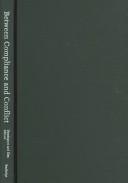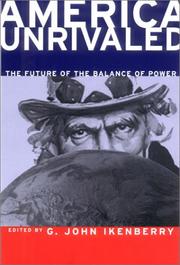| Listing 1 - 10 of 124 | << page >> |
Sort by
|
Book
ISBN: 9048529891 9462980527 9789048529896 9789048529902 9048529905 9789462980525 Year: 2015 Publisher: Amsterdam : Amsterdam University Press,
Abstract | Keywords | Export | Availability | Bookmark
 Loading...
Loading...Choose an application
- Reference Manager
- EndNote
- RefWorks (Direct export to RefWorks)
We tend to think of ourselves as living in a time when nations, for the most part, obey the rule of law - and where they certainly don't engage in the violent grabs for territory that have characterised so much of human history. But as Rob de Wijk shows in this book, power politics very much remains a force on the international scene. Offering analyses of such actions as Putin's annexation of the Crimea and China's attempts to claim large parts of the South China Sea, de Wijk explains why power politics never truly went away-and why, as the West's position weakens, it's likely to play a bigger and bigger role on the global stage in the coming years.
POLITICAL SCIENCE / General. --- Balance of power. --- Power, Balance of --- Power politics --- International relations --- Political realism --- Politics.
Book
ISBN: 8132114035 1283575655 9786613888105 8132110765 9788132110767 9788132109440 8132109449 8132117034 9788132117032 9788132114031 9781283575652 Year: 2012 Publisher: New Delhi : SAGE,
Abstract | Keywords | Export | Availability | Bookmark
 Loading...
Loading...Choose an application
- Reference Manager
- EndNote
- RefWorks (Direct export to RefWorks)
'Toward a Geopolitics of Hope' posits a world order marked less by univocal 'globalisation' than by a grating geopolitics of rival capitalisms. Now that China, Russia, and much of the undemocratic developing world have embraced capitalism, this new Second World can no longer be regarded as a fleeting phenomenon. Globalisation turns out to be anything but the steadfast ally of democratisation it purports to be. Indeed, the Western democratic experiment of the last two centuries is starting to look very tentative and parochial.
Geopolitics --- Balance of power --- Power, Balance of --- Power politics --- International relations --- Political realism --- World politics --- History

ISBN: 1283969416 0203956400 1136769765 9781136769764 9780203956403 9780415951241 0415951240 9780415951258 0415951259 9781283969413 9781136769832 9781136769900 1136769838 Year: 2005 Publisher: New York : Routledge,
Abstract | Keywords | Export | Availability | Bookmark
 Loading...
Loading...Choose an application
- Reference Manager
- EndNote
- RefWorks (Direct export to RefWorks)
This book examines the responses to U.S. power in the two areas of the world where U.S. primacy was first successfully consolidated: East Asia and Latin America. The U.S. has faced no comparably powerful challengers to the exercise of its power in Latin America for much of the past century. It established its primacy over much of East Asia in the aftermath of WW II and extended its influence in the late 1970's and after the end of the Vietnam War through its entente with China to balance the Soviet Union. By contrast, the U.S. has always encountered rivals and challengers in Europe, has attemp
Balance of power. --- Power, Balance of --- Power politics --- International relations --- Political realism --- United States --- East Asia --- Latin America --- Foreign relations
Book
ISBN: 9814279722 9814279714 Year: 2010 Publisher: Singapore : Institute of Southeast Asian Studies,
Abstract | Keywords | Export | Availability | Bookmark
 Loading...
Loading...Choose an application
- Reference Manager
- EndNote
- RefWorks (Direct export to RefWorks)
Asia is rising and will wield greater economic and strategic weight in world affairs. However Asia also faces numerous challenges like poverty, domestic instability, deficiencies in governance and the rule of law, inter-state disputes and rivalries, and military build-ups, to name just a few. The celebration of Asia's rise would be premature if it is not accompanied by lasting peace and cooperation between states and justice and prosperity at home. The achievement of this happy state of affairs will require continuation of wise and pragmatic leadership, especially among the major powers. This collection of essays reflects on some of the major political and security issues in the region in recent times, including the balance of power among the major powers, American engagement and policies in Asia, India's rise, the global war on terrorism, the Iraq war, domestic developments in some countries as well as ASEAN's efforts to build regional peace and security.
National security --- Balance of power. --- Power, Balance of --- Power politics --- International relations --- Political realism --- Asia --- Foreign relations.
Book
ISBN: 1760461180 1760461172 9781760461188 9781760461171 Year: 2017 Publisher: Acton, Australia : Australian National University Press,
Abstract | Keywords | Export | Availability | Bookmark
 Loading...
Loading...Choose an application
- Reference Manager
- EndNote
- RefWorks (Direct export to RefWorks)
"The global system of alliances that the United States built after the Second World War underpinned the stability and prosperity of the postwar order. But during the 20th century, the multilateral NATO alliance system in Europe and the bilateral San Francisco alliance system in Asia rarely interacted. This changed in the early 21st century, as US allies came together to fight and stabilise conflicts in the Middle East and Central Asia. This volume presents the first-ever comparative study of US alliances in Europe and Asia from the perspectives of US allies: the challenges, opportunities and shifting dynamics of these fundamental pillars of order. This volume is essential reading for those interested in contemporary and future regional and global security dynamics." --
Balance of power. --- Alliances. --- United States --- Foreign relations --- Alliances --- Treaties of alliance --- Power, Balance of --- Power politics --- Law and legislation --- International relations --- Treaties --- Political realism
Book
ISBN: 0190697555 9780190697556 Year: 2017 Publisher: New York, NY : Oxford University Press,
Abstract | Keywords | Export | Availability | Bookmark
 Loading...
Loading...Choose an application
- Reference Manager
- EndNote
- RefWorks (Direct export to RefWorks)
The BRICS (China, Russia, India, Brazil, and South Africa), an exclusive international club, perceive an ongoing global power shift and contest the West's pretensions to permanent stewardship of the liberal economic order. Against expectations, they have exercised collective financial statecraft with remarkable success to seek reforms, influence, and leadership roles.
Balance of power. --- BRIC countries --- Foreign economic relations. --- Foreign relations. --- Power, Balance of --- Power politics --- International relations --- Political realism --- Big Four countries --- BRICS countries
Book
ISBN: 9048552451 9463722548 Year: 2022 Publisher: Amsterdam, Netherlands : Amsterdam University Press B.V.,
Abstract | Keywords | Export | Availability | Bookmark
 Loading...
Loading...Choose an application
- Reference Manager
- EndNote
- RefWorks (Direct export to RefWorks)
The volume collects a series of contributions that help reconstruct the recent history of the Nath tradition, highlighting important moments of self-reinterpretation in the sampradaya's interaction with different social milieus. The leitmotif tying together the selection of articles is the authors' explorations of the overlap between religious authority and political power. For example, in which ways do the Naths' hagiographical claim of possessing yogic charisma (often construed as supernatural powers, siddhis) translate into mundane expressions of socio-political power? And how does it morph into the authority to reinterpret and recreate particular traditions? The articles approach different aspects of the recent history of the Nath sampradaya, spanning from stories of yogis guiding kings in the petty principalities of the eighteenth century to gurus who sought prominence in the transnational environments of the twentieth century; examining some Nath lineages and institutions under the British Raj, in the history of Nepal, and in contemporary India.
Nātha sect. --- HEALTH & FITNESS / Yoga. --- Hindu sects --- Yogi, Power, Politics, Asceticism. --- Nātha sect --- History. --- Social aspects. --- Political aspects. --- Religion and politics.
Book
ISBN: 1501754718 Year: 2021 Publisher: Ithaca, New York ; London : Cornell University Press,
Abstract | Keywords | Export | Availability | Bookmark
 Loading...
Loading...Choose an application
- Reference Manager
- EndNote
- RefWorks (Direct export to RefWorks)
Timothy W. Crawford's 'The Power to Divide' examines the use of wedge strategies, a form of divisive statecraft designed to isolate adversaries from allies and potential supporters to gain key advantages.

ISBN: 3506737244 Year: 1997 Publisher: Paderborn Schöningh
Abstract | Keywords | Export | Availability | Bookmark
 Loading...
Loading...Choose an application
- Reference Manager
- EndNote
- RefWorks (Direct export to RefWorks)
World history --- anno 1700-1799 --- World politics --- -Balance of power --- Power, Balance of --- Power politics --- International relations --- Political realism --- Colonialism --- Global politics --- International politics --- Political history --- Political science --- Eastern question --- Geopolitics --- International organization --- Balance of power. --- Balance of power

ISBN: 0801488028 9780801488023 0801440637 9780801440632 Year: 2002 Volume: *15 Publisher: Ithaca London Cornell University Press
Abstract | Keywords | Export | Availability | Bookmark
 Loading...
Loading...Choose an application
- Reference Manager
- EndNote
- RefWorks (Direct export to RefWorks)
Balance des pouvoirs --- Balance of power --- Machtsevenwicht --- Power [Balance of ] --- Power politics --- Puissances [Équilibre des ] --- Équilibre des pouvoirs --- Équilibre des puissances --- Équilibre international --- Balance of power. --- National security --- United States --- Foreign relations --- 2001-2009
| Listing 1 - 10 of 124 | << page >> |
Sort by
|

 Search
Search Feedback
Feedback About UniCat
About UniCat  Help
Help News
News